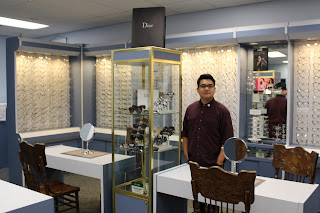LITERAL
(a) Write: “I, ___Daren Lugo___, affirm that I completed my independent component which represents __30__ hours of work.”
(b) I worked with my mentor Betty A. Lugo who is an optician at Dr. Donald H. Spaulding's office in Upland, CA. She has worked in that office for over 13 years and has also worked at other offices before this one.
(c) I have updated my hours with all the stuff I have done.
(d) For the last two months I have been doing extra hours at the office as well as learning new things about how to correctly work with patients.
INTERPRETIVE
Since I've been working my extra thirty hours I have been able to shadow, study, and observe the opticians and the Optometrist himself. The opticians have a better understanding of how to engage the patients in such a way that is effective and efficient. I sometimes was able to assist the patients myself and most of them were elders and very kind.
This is me on 1/26/2016
On 1/26/2016, this recent week, I was able to take photos because there weren't many people there. I am usually not able to take photos because it makes the patients a bit uneasy. I was able to take photos before this but it was way back in December and there weren't many.
Photo taken by mentor
Here in this picture are the walls of frames that I have to clean off every time I am in there. I usually start off with these first, On this day I was a bit hindered by the fact that I actually fell off a stole while dusting behind the top row of frames. It hurt but I was okay.
This is me on 12/30/2015
This is one of the pictures I was able to take a month before the ones above. On this day I did my usual filing, cleaning of glasses, and was able to assist a couple of patients. This was the day that the doctor spent more than 45 minutes with a patient on. Usually examinations are supposed to be 15-20 minutes max. One of the patients left angry this day. What a shame.
Here is another picture of the office.
Here is me in front of the office. It's a pleasant little area.
Here are some of the files that I have to organize and put into alphabetical order. If patients have an appointment within the next week or so, I pull the files and put them in order based on the time they come in.
APPLIED
Allowing me to work more hours helped me to observe and study the patient-doctor relationship a bit better. It allowed me to grasp more information as to how much non-compliance affects the field. People put a lot of trust into the doctor and they expect him to be the best he can at his job. He has chosen his opticians wisely and all of them together have great chemistry.
Grading Criteria
Updated log in Senior Project Hours Link (Check)
Evidence of 30 hours of work (Check)
LIA submitted to blog (Check?)
Here is the official video for the place I do my hours at. The Optometrist shown in the video is my old mentor. I have now switched over to one of his opticians also shown below.
My current mentor: Betty A. Lugo










